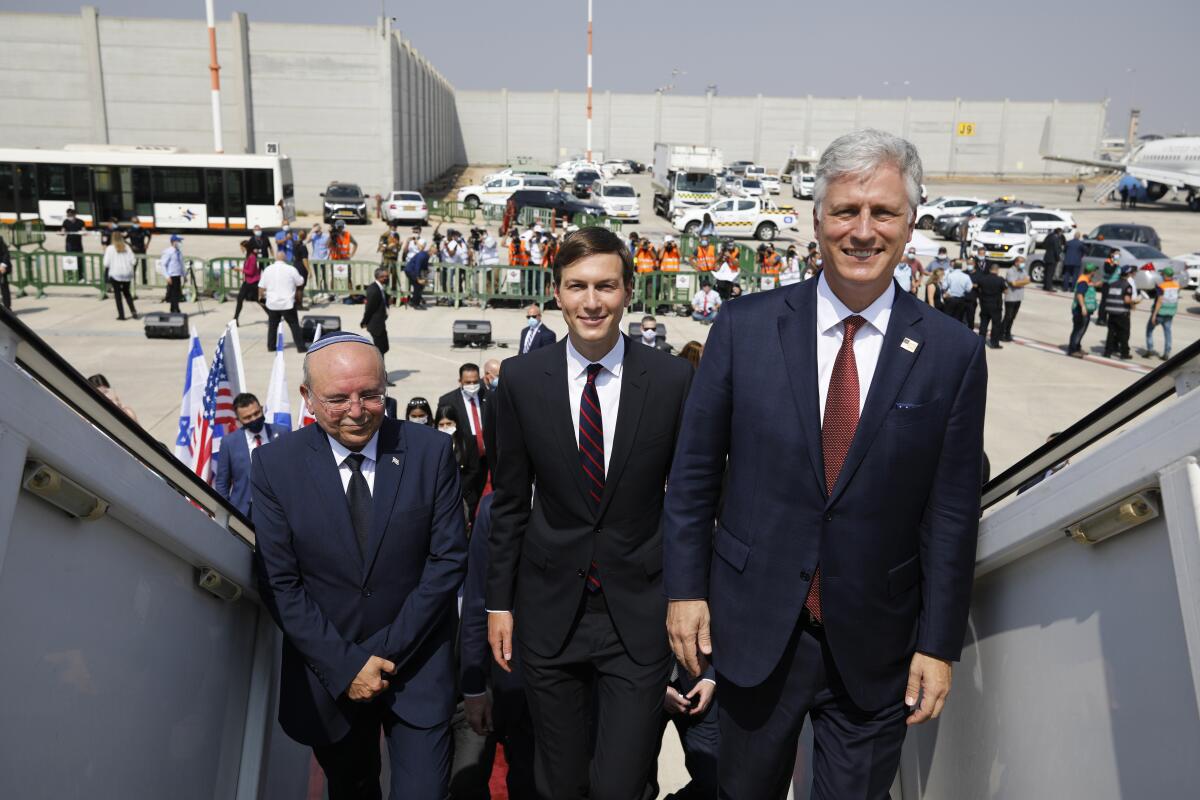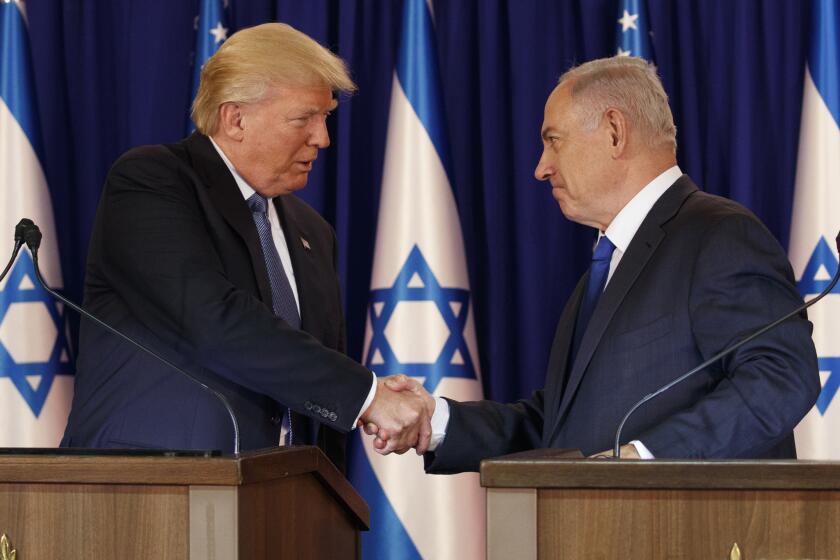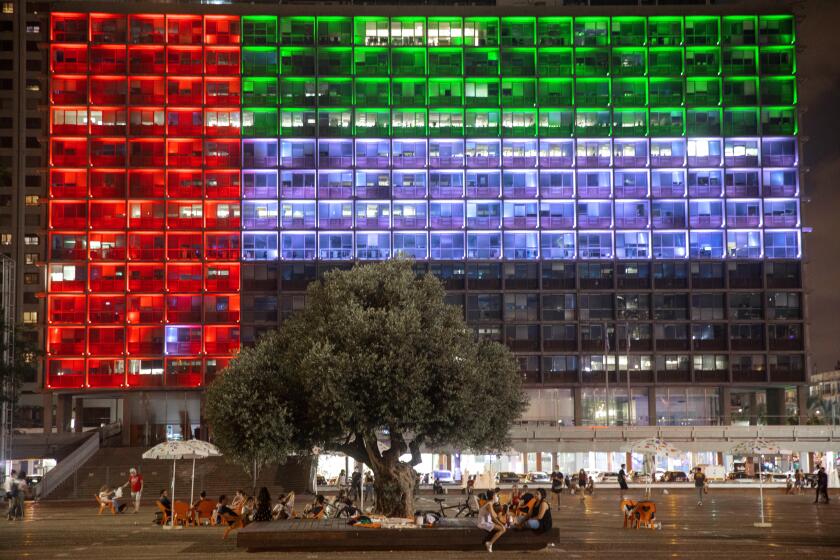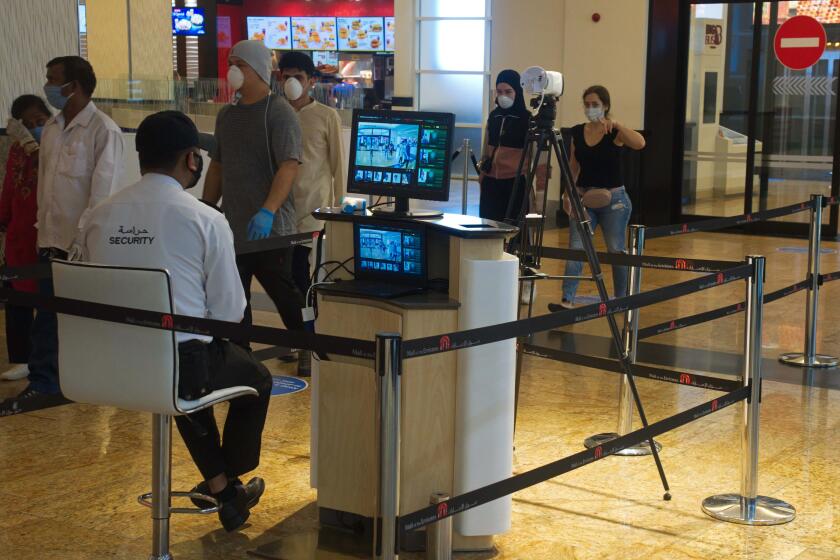First direct commercial passenger flight from Israel to UAE lands

- Share via
ABU DHABI, United Arab Emirates — A Star of David-adorned El Al plane flew from Tel Aviv to Abu Dhabi on Monday, the first-ever direct commercial passenger flight from Israel to the United Arab Emirates.
The flagship Israeli airline’s flight marks the implementation of a U.S.-brokerred deal to normalize relations between the two nations and solidifies the often-clandestine ties between them that evolved out of shared enmity toward Iran.
With the U.S. as matchmaker, Israel and the UAE agreed earlier this month to work toward normalization, which would make the UAE the third Arab nation to have full relations with Israel, after Egypt and Jordan. But unlike those two nations, Israel has never fought a war against the UAE and hopes to have much warmer relations.
The flight to Abu Dhabi carried high-ranking American and Israeli delegations. The U.S. group included President Trump’s senior advisor and son-in-law, Jared Kushner, as well as National Security Advisor Robert O’Brien, Mideast envoy Avi Berkowitz and Iran envoy Brian Hook. Israel was represented by its national security advisor, Meir Ben-Shabbat, and the directors-general of several ministries, who will meet with their Emirati counterparts.
“While this is a historic flight, we hope that this will start an even more historic journey for the Middle East and beyond,” Kushner told reporters before boarding the plane.
Meir Ben-Shabbat said he was excited about the trip and that the aim was to lay the groundwork for cooperation in areas such as tourism, medicine, technology and trade. “This morning the traditional greeting of ‘Go in peace’ takes on a special significance for us,” he said.
The agreement between Israel and the United Arab Emirates announced by the White House is welcome. Yet the region seems no closer to a “two-state solution” in which an independent Palestinian state would peacefully coexist with Israel.
The El Al flight, numbered LY971 in a gesture to the UAE’s international dialing code, flew into Saudi Arabian airspace shortly after takeoff. That marked another historic first for Israel and at least a tacit acquiescence by the kingdom to the UAE’s move.
Saudi King Salman, along with other Gulf Arab leaders, maintain boycotts of Israel in varying degrees, out of support for Palestinians and their quest for an independent state. Any long-term flights between Israel and the UAE would require Saudi clearance to be profitable. Otherwise, the flight, which takes three hours and 20 minutes direct, would take more than seven hours on a more circuitous route.
El Al spokesman Stanley Morais said the 737-900 was equipped with a missile-defense system, a standard feature on these types of planes and a requirement for this flight. Monday’s flight to Abu Dhabi was the first since July 1 for the airline, which grounded its fleet because of the coronavirus.
The plane was decorated with the the word “peace” in Arabic, Hebrew and English above the pilot’s window. Journalists were given special face masks decorated with the Israeli and Emirati flags. The seat protectors said “Making History” in all three languages, and Israeli folk music played in the background.
Iran’s powerful Revolutionary Guard has vowed that there will be dangerous consequences for the United Arab Emirates after it announced a historic deal with Israel to open up full diplomatic relations.
The plane’s captain, Tal Becker, said he had not worked for several months and had received a call out of the blue asking him to prepare for the flight. He said it took about a week to get up to speed.
Becker, who is the senior captain in El Al’s 737 fleet, said he never dreamed of flying to Abu Dhabi, calling it a “very special feeling.”
The Israeli delegation will stay in the capital, Abu Dhabi, for one night before returning home on El Al flight LY972, which is a nod to Israel’s international dialing code.
Private jets have earlier flown between the two nations as part of covert talks, and Abu Dhabi’s Etihad Airways flew cargo freighters to Israel to deliver coronavirus aid to the Palestinians. But the high-profile flight Monday, eagerly promoted by U.S. officials, looks to place a stamp on the surprise Aug. 13 White House announcement of Israel and the UAE establishing ties.
Get our L.A. Times Politics newsletter
The latest news, analysis and insights from our politics team.
You may occasionally receive promotional content from the Los Angeles Times.
Since then, direct telephone calls between the two countries were connected, and the UAE’s ruler issued a decree formally ending the country’s decades-long boycott of Israel. Some Israeli firms have already signed deals with Emirati counterparts. More business cooperation in fields such as aviation, banking and finance is expected.
The UAE has touted the deal as a tool to force Israel into halting its contentious plan to annex parts of the West Bank sought by the Palestinians for their future state. It also may help the UAE acquire advanced U.S. weapons systems that have been previously unobtainable, such as the F-35 fighter jet. Currently, Israel is the only country in the region with the stealth warplanes.
The Palestinians, however, have fiercely opposed the normalization as peeling away one of their few advantages in moribund peace talks with Israel. Palestinians have held public protests and burned the UAE flag in anger.
Palestinian Prime Minister Mohammad Shtayyeh said it was “very painful” to see the flight, which he said was a “clear violation of the Arab position on the Arab-Israeli conflict.”
“We had hoped to see an Emirati plane landing in a liberated Jerusalem,” he added.
The coronavirus crisis has led to some tentative attempts at cooperation between Arab nations and Israel, which many of them do not recognize.
Israelis eagerly anticipate the prospect of mutual embassies, expanding tourism to the Gulf and solidifying business opportunities with another country that shares its penchant for technology and innovation.
Israeli Prime Minister Benjamin Netanyahu has touted the deal as validation of his vision that regional peace doesn’t have to go through Palestinian acquiescence and come at the cost of ceding land. But he has come under fire from supporters at home for seemingly giving up on dreams of annexation and tacitly agreeing to a questionable arms sale that could undermine Israel’s regional superiority. Netanyahu denies that such a deal exists.
On Sunday, Kushner said “the stage is now set” for other Arab countries to follow the UAE in establishing official ties with Israel. He gave no indication, however, that any other deals were imminent, despite a swing through the region last week by U.S. Secretary of State Michael R. Pompeo.
More to Read
Sign up for Essential California
The most important California stories and recommendations in your inbox every morning.
You may occasionally receive promotional content from the Los Angeles Times.
















